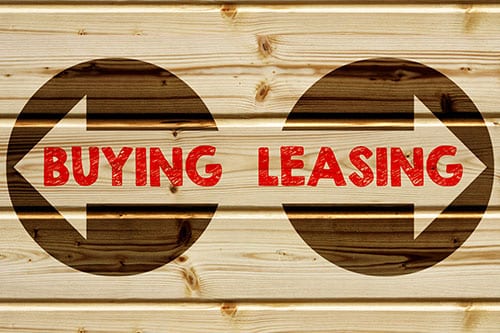Lease vs Purchase – Which is Right for Your Business?
Starting and operating a business involves a myriad of financial and operational decisions. When it comes to equipment used in the business, both operational and financial components enter the buy vs lease decision.
Placing equipment into service involves considerations for cash flow, maintenance, flexibility of use, tax deductibility, life span, and morei. The initial cost of equipment and the financial capabilities of the company are also considerations. Starting with leasing, here are the pros and cons of bothii.
Leasing
PROs
- Under the Section 179 IRS Tax Code, the cost of leasing equipment is usually 100% deductible as expensed.
- When you are purchasing equipment, you may be limited in choice by concerns about up-front costs or newly developed but untested equipment. With leasing you may be able to lease that expensive and state-of-the-art item.
- Leasing helps cash flow planning, as you have predictable payments without large outlays for a purchase or down payment.
- If equipment has a short lifecycle, such as computers that become obsolete or are superseded by new developments, it is often better to lease rather than buy.
- In most lease agreements, you do not pay for maintenance, so you do not have surprise expenses when problems arise.
Those are the pros for leasing rather than buying. Now for the cons.
CONs
- You do not build equity or improve your balance sheet with leasing. You do not own the equipment and have nothing to sell when you retire it.
- Interest and fees make the cost over time higher for leased equipment in many cases.
- Though they may provide maintenance and repairs at no cost, you are at the mercy of the leasing company when it comes to their speed of response and corrective actions.
- Often you do not have as wide a choice of equipment brands, models, or styles when leasing.
Next you can compare the pros and cons of buying for your business needs.
Buying
PROs
- You own the equipment, so you have something to sell when you retire it from use.
- Owning the equipment also allows you to enhance or modify it when necessary.
- Buying, other than financing, does not involve contracts or agreements.
- Choice of equipment is wider when you can shop multiple vendors, brands, and equipment models.
- You may be able to take accelerated depreciation deductions to increase expense in higher income years.
Generally, more control and financial flexibility comes with buying.
CONs
- Buying carries a higher initial cost, a cash flow issue in the year of purchase.
- If the type of equipment becomes outdated quickly, such as computers, you usually are stuck with it longer when you own it. The cost to replace it is high.
- You are responsible for all costs of maintenance and repairs, though you do have more control of timing and quality.
Buying versus leasing becomes an easier decision to make when you compare the pros and cons of each.
i Leasing vs Buying Equipment, Nav.com
ii Pros and Cons of Leasing vs Buying, Quickbooks.Intuit.com

